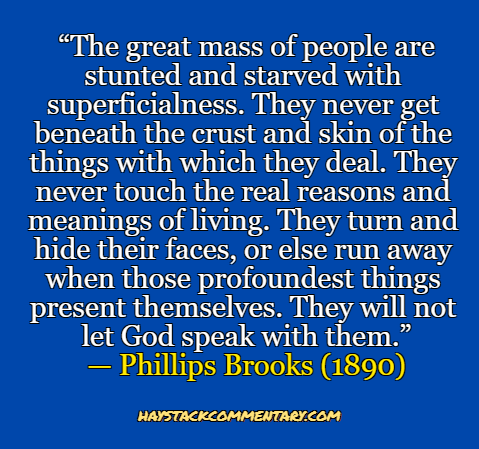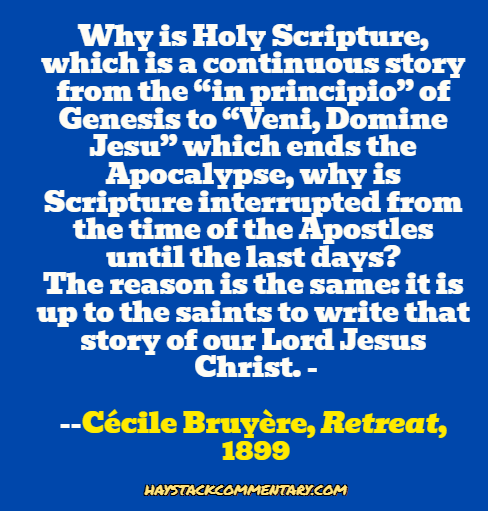- David Brainerd - William Bridge - Jerry Bridges - Bill Bright - Phillips Brooks - Cecile Bruyere - Heinrich Bullinger - John Bunyan - Jeremiah Burroughs - Richard Girnt Butler - Calvin Otis Butts II -
==david brainerd======
David Brainerd (April 20, 1718 – October 9, 1747) was an American Presbyterian minister and missionary to the Native Americans among the Delaware Indians of New Jersey. Missionaries such as William Carey and Jim Elliot, and Brainerd's cousin, the Second Great Awakening evangelist James Brainerd Taylor (1801–1829) cite Brainerd as inspiration. On July 12, 1739, he recorded having an experience of "unspeakable glory" that prompted in him a "hearty desire to exalt [God], to set him on the throne and to 'seek first his Kingdom'". This has been interpreted by evangelical scholars as a conversion experience. In November 1746, he became too ill to continue ministering, and so moved to Jonathan Dickinson's house in Elizabethtown and later to Jonathan Edwards' house in Northampton, Massachusetts. Apart from a trip to Boston in the summer of that year, he remained at Edwards's house until his death the following year. In May 1747, he was diagnosed with incurable consumption.
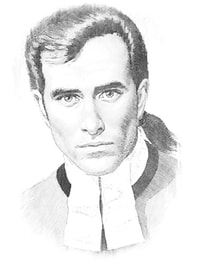 David Brainerd Files
David Brainerd Files
"Oh, that I could dedicate my all to God. This is all the return I can make Him."
"It is impossible for any rational creature to be happy without acting all for God. God Himself could not make him happy any other way... There is nothing in the world worth living for but doing good and finishing God's work, doing the work that Christ did. I see nothing else in the world that can yield any satisfaction besides living to God, pleasing Him, and doing his whole will."
"Here am I, send me; send me to the ends of the earth; send me to the rough, the savage pagans of the wilderness; send me from all that is called comfort on earth; send me even to death itself, if it be but in Thy service, and to promote Thy kingdom."
"My desires seem especially to be after weanedness from the world, perfect deadness to it, and that I may be crucified to all its allurements. My soul desires to feel itself more of a pilgrim and a stranger here below, that nothing may divert me from pressing through the lonely desert, till I arrive at my Father's house."
"This morning about nine I withdrew to the woods for prayer. I was in such anguish that when I arose from my knees I felt extremely weak and overcome. ...I cared not how or where I lived, or what hardships I went through, so that I could but gain souls for Christ."
"Oh, that I could spend every moment of my life to God's glory!"
"I have received my all from God. Oh, that I could return my all to God."
"It is sweet to be nothing and less than nothing that Christ may be all in all."
"All my desire was the conversion of the heathen... I declare, now I am dying, I would not have spent my life otherwise for the whole world." --David Brainerd
"It is impossible for any rational creature to be happy without acting all for God. God Himself could not make him happy any other way... There is nothing in the world worth living for but doing good and finishing God's work, doing the work that Christ did. I see nothing else in the world that can yield any satisfaction besides living to God, pleasing Him, and doing his whole will."
"Here am I, send me; send me to the ends of the earth; send me to the rough, the savage pagans of the wilderness; send me from all that is called comfort on earth; send me even to death itself, if it be but in Thy service, and to promote Thy kingdom."
"My desires seem especially to be after weanedness from the world, perfect deadness to it, and that I may be crucified to all its allurements. My soul desires to feel itself more of a pilgrim and a stranger here below, that nothing may divert me from pressing through the lonely desert, till I arrive at my Father's house."
"This morning about nine I withdrew to the woods for prayer. I was in such anguish that when I arose from my knees I felt extremely weak and overcome. ...I cared not how or where I lived, or what hardships I went through, so that I could but gain souls for Christ."
"Oh, that I could spend every moment of my life to God's glory!"
"I have received my all from God. Oh, that I could return my all to God."
"It is sweet to be nothing and less than nothing that Christ may be all in all."
"All my desire was the conversion of the heathen... I declare, now I am dying, I would not have spent my life otherwise for the whole world." --David Brainerd
 David Brainerd
David Brainerd
“I had been heaping up my devotions before God, fasting, praying, & pretending, and indeed really thinking sometimes, that I was aiming at the glory of God; whereas I never once truly intended it, but only my own happiness. I”
― David Brainerd, The Life and Diary of David Brainerd with Notes and Reflections by Jonathan Edwards
==william bridge=================
William Bridge (c. 1600 – 1670) was born in Cambridgeshire. He was a leading English Independent minister, preacher, and religious and political writer. He entered Emmanuel College at the age of sixteen, became M.A. in 1626, and was many years a fellow of the college. In 1631 he was appointed to the lectureship of Colchester, where he continued but a short time. In 1633 he held a Friday lecture at St. George’s Tombland, Norwich, for which he was paid by the corporation. In 1636 he was the rector for St. Peter’s Hungate, Norwich, a living at that time worth no more than 22l. per annum. Here he was silenced by Bishop Wren. He continued, however, in the city for some time after his suspension until he was ‘excommunicated ‘ and the writ ‘de capiendo’ came forth against him. He took refuge in Holland and settled at Rotterdam, succeeding as pastor the celebrated Hugh Peters, and he was thus associated in the pastorate with Jeremiah Burroughs. From a passage in the ‘Apologetical Narration’ it may be inferred that Bridge received much support from the magistrates of the city, and that many wealthy persons joined the church, some of whom had fled from the persecution of Bishop Wren. While at Rotterdam he renounced the ordination which he had received when he entered the church of England, and was again ordained, after the independent way, by Samuel Ward, B.D., after which he similarly ordained Ward.
 William Bridge
William Bridge
If Christ be in you, then why should you not venture upon any work or service for God, although it do lie beyond you, and beyond your strength, and expect large and great things from him?
You say, sometimes, you would do such or such a thing for God, but you have no strength to do it.
But if Christ be in you, and really united unto your soul, then surely you shall have strength enough, and you may expect large and great things from him.
Therefore, venture upon work and service for God; yea, although they do lie beyond your present strength, be not unwilling thereunto, but expect great things from God, because Christ is really in you.
–William Bridge, "The Spiritual Life and In-Being of Christ in All Believers, in Works
You say, sometimes, you would do such or such a thing for God, but you have no strength to do it.
But if Christ be in you, and really united unto your soul, then surely you shall have strength enough, and you may expect large and great things from him.
Therefore, venture upon work and service for God; yea, although they do lie beyond your present strength, be not unwilling thereunto, but expect great things from God, because Christ is really in you.
–William Bridge, "The Spiritual Life and In-Being of Christ in All Believers, in Works
 William Bridge
William Bridge
“We do not live by feeling, but by faith: it is the duty of a Christian to begin with faith, and so to rise up to feeling: you would begin with feeling, and so come down to faith; but you must begin with faith, and so rise up to feeling. And I pray tell me, is it not sufficient to be as our Master was? Did not Christ want the sense of God's love, when he said, "My God, my God, why hast thou forsaken me?" Yea, had not Christ the sense of God's anger upon him when he did perform the greatest act of obedience that ever the sun saw: yet did he then say, I am not the child of God, because I want the sense of God's love, because I am under the sense of God's anger? No, but with the same breath that he said he was forsaken, he said, "My God, my God;" and at the same time he called God Father, "Father, forgive them," &c. So may you do; though God hath forsaken you, though you want the sense of his love, yea, and are under the sense of God's anger; yet at the same time you may say, The Lord is my Father, and you may go to him as your Father: and if you can say, God is my Father, have you any reason for your discouragements?”
― William Bridge, A Lifting Up for the Downcast
― William Bridge, A Lifting Up for the Downcast
==jerry bridges=============
Jerry Bridges (December 4, 1929 – March 6, 2016) was an evangelical Christian author, speaker and staff member of The Navigators. Born in Tyler, Texas, United States, he was the author of more than a dozen books, including The Pursuit of Holiness, which has sold more than one million copies. His devotional Holiness Day by Day garnered the 2009 ECPA Christian Book Award for the inspiration and gift category, and The Discipline of Grace received a similar award in 1995 for the Christian living category. Bridges earned his undergraduate degree in engineering at the University of Oklahoma before serving as an officer in the United States Navy during the Korean War. He joined Christian discipleship organization The Navigators in 1955, where he served as administrative assistant to the Europe Director, office manager for the headquarters office, Secretary-Treasurer of the organization, and as Vice President for Corporate Affairs before moving to a staff development position with the Collegiate Mission.
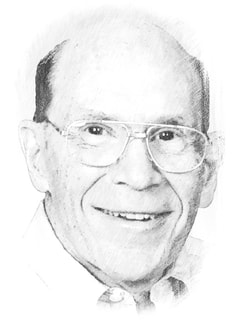 Jerry Bridges Files
Jerry Bridges Files
The healing of the demon possessed boy (Matt. 17:14–20) at first glance seems to be only one more in a series of miraculous healings recorded by Matthew. What makes this one unique is Jesus’ emphasis on the role of faith. It is true that faith is prominent in the miracles recorded in chapter 9, but in chapter 17 it is the lack of faith that is emphasized by Jesus. That God is not dependent on human faith for accomplishing His work is clear from the accounts of other miracles recorded by Matthew. The transfiguration of Jesus immediately prior to the healing of the boy is a prime example. It was a spectacular miracle; yet no human faith was involved. This is also true in the feeding of the five thousand (Matt. 14:13–21) and the four thousand (15:32–38). So the first thing we need to learn about faith and the power of God is that He is not dependent on our faith to do His work. God will not be hostage to our lack of faith. The second thing we need to learn, however, is that God often requires our faith in the carrying out of His purposes. We see this in the healing of the demon possessed boy. Mark, in his account, brings this out sharply in Jesus’ conversation with the boy’s father. The father, in great distress, said to Jesus: “But if you can do anything, have compassion on us and help us” (Mark 9:22). He had already experienced the failure of the disciples, so he was not sure if Jesus could help. His faith at this point may be described as no more than an uncertain hope that Jesus could do what the disciples could not do. Jesus responded to the father: “If you can! All things are possible for one who believes” (v. 23). Biblical faith may be described in different ways depending on the situation. The description of faith in Hebrews 11:1 as “the assurance of things hoped for, the conviction of things not seen,” was appropriate for the Jewish recipients of the letter, who were facing severe opposition and needed to be encouraged as to the certainty of their hope in Christ. For the father of the boy, faith would mean believing that Jesus could heal his son. We are often like the father. We may face what seems to be an intractable situation, and because we have prayed a long time without an answer, we begin to doubt that God can answer our prayer. But we must believe that with God nothing is impossible. --Jerry Bridges
-==bill bright=================
 Chuck Colson
Chuck Colson
“In his final days Bill Bright gave his staff a charge, which ended with these words: “By faith, walk in His light, enjoy His presence, love with His love, and rejoice that you are never alone; He is with you, always to bless!” Bill Bright understood that the good life means accepting that our lives ultimately belong to God. He resisted taking sedatives that would have hastened his death. He also talked with Vonette about the importance of yielding to God’s final call. Perhaps as a result of his attitude (and, I have to think, his godliness), his last moments were not the unmitigated horror his doctor had predicted. Right before Bill died, Vonette leaned close and said, “I want you to go to be with Jesus, and Jesus wants you to come to him. Why don’t you let him carry you to heaven?” She looked away, and when she looked back, her husband was no longer breathing. She saw the last pulse in his neck, and with that he was gone. She thought of the psalm “Precious in the sight of the Lord is the death of his saints,” and the prayer of St. Francis of Assisi: “For it is in dying, we are born to eternal life.”4 Living the good life means not only living it to the fullest every moment we’re alive but also facing death with equanimity and then dying well. A lot of people have this wrong. They think that you live life to the fullest and enjoy every moment you can, and then when death comes, you simply accept the hard fact. The good time is over. Life is ended. The good life means accepting that our lives ultimately belong to God.” ― Charles W. Colson, The Good Life
--phillips brooks----------
Phillips Brooks (December 13, 1835 – January 23, 1893) was an American Episcopal clergyman and author, long the Rector of Boston's Trinity Church and briefly Bishop of Massachusetts. He wrote the lyrics of the Christmas hymn, "O Little Town of Bethlehem". He is honored on the Episcopal Church liturgical calendar on January 23. He died unmarried in 1893, after an episcopate of only 15 months. His death was a major event in the history of Boston. One observer reported: "They buried him like a king. Harvard students carried his body on their shoulders. All barriers of denomination were down. Roman Catholics and Unitarians felt that a great man had fallen in Israel."
--mere cecile bruyere-----
Mère Cécile Bruyère (12 October 1845 – 18 March 1909) was the first abbess of St. Cecilia's Abbey, Solesmes (Abbaye Sainte-Cécile de Solesmes) and a follower of Dom Prosper Guéranger in the revival of Benedictine spirituality in 19th century France. The French anti-religious laws of the early 20th century forced the whole community into exile in England, to the forerunner of the present St. Cecilia's Abbey, Ryde, on the Isle of Wight, where on 18 March 1909 Mother Cécile died. When the community was at last able to return to Solesmes, in 1921, her body was also transported and re-buried there.
"Trials are always accompanied by the grace to bear them. When the Lord engages us in a battle, he makes sure that we shall have the means to be victorious." —Cécile Bruyère, 28 November 1890, quoted in Sister Mary David Totah OSB, The Spirit of Solesmes, 97.
"Isn't suffering the law of life since the first sin? Have you ever seen anyone escape it?
So the happy ones are not those who do not suffer, for then there would be none in this world, but those who know how to suffer. … You must take your courage in both hands and turn to our Lord , from whom will come your help. I assure you that I have experienced this very forcefully since the death of our great abbot.
One must bear everything, and be no longer borne up by anyone; and I can state firmly to you that with that burden I am perfectly content, as long as I do not look at things from the point of view of self-love and as long as, in the depths of my heart, I throw myself upon Jesus, who alone possess within himself beauty, goodness, truth, and all that could ever captivate us. … Believe me: do not be afraid to suffer in this world." —Cécile Bruyère, Letter 17 February 1877, quoted in Sister Mary David Totah OSB, The Spirit of Solesmes, 96.
So the happy ones are not those who do not suffer, for then there would be none in this world, but those who know how to suffer. … You must take your courage in both hands and turn to our Lord , from whom will come your help. I assure you that I have experienced this very forcefully since the death of our great abbot.
One must bear everything, and be no longer borne up by anyone; and I can state firmly to you that with that burden I am perfectly content, as long as I do not look at things from the point of view of self-love and as long as, in the depths of my heart, I throw myself upon Jesus, who alone possess within himself beauty, goodness, truth, and all that could ever captivate us. … Believe me: do not be afraid to suffer in this world." —Cécile Bruyère, Letter 17 February 1877, quoted in Sister Mary David Totah OSB, The Spirit of Solesmes, 96.
"Allow me to suggest to you a strange idea: why has the Lord not left us a portrait of himself? Tradition, I know, has passed down to us an adequate general picture of the features of the Lord; but, why, after all, did he not come in the era of photography? Quite simple: everyone would have believed naively that this portrait of the Lord was the Lord himself.
No: where is the likeness of the Lord to be found? In souls. What is the true portrait of the Lord? It is yourselves.
Another question: why is Holy Scripture, which is a continuous story from the “in principio” of Genesis to “Veni, Domine Jesu” which ends the Apocalypse, why is Scripture interrupted from the time of the Apostles until the last days? The reason is the same: it is up to the saints to write that story of our Lord Jesus Christ. ---Cécile Bruyère, Retreat, 1899, quoted in Sister Mary David Totah OSB, The Spirit of Solesmes, 83.
No: where is the likeness of the Lord to be found? In souls. What is the true portrait of the Lord? It is yourselves.
Another question: why is Holy Scripture, which is a continuous story from the “in principio” of Genesis to “Veni, Domine Jesu” which ends the Apocalypse, why is Scripture interrupted from the time of the Apostles until the last days? The reason is the same: it is up to the saints to write that story of our Lord Jesus Christ. ---Cécile Bruyère, Retreat, 1899, quoted in Sister Mary David Totah OSB, The Spirit of Solesmes, 83.
"You say that both time and strength are limited. Yes, certainly, when one calculates. But if we let the Lord act, if we take everything he sends, if we abandon ourselves in pure faith, if we bow our heads and say, “Behold the handmaid of the Lord,” I believe that he solves all the problems himself.
It was hard for me to believe that. Common sense told me that there are only sixty minutes in an hour, but he for whom a thousand years are as one day has proved to me hundreds of times that he is the Lord of time as of everything else." —Cécile Bruyère, quoted in Sister Mary David Totah OSB, The Spirit of Solesmes, 67.
It was hard for me to believe that. Common sense told me that there are only sixty minutes in an hour, but he for whom a thousand years are as one day has proved to me hundreds of times that he is the Lord of time as of everything else." —Cécile Bruyère, quoted in Sister Mary David Totah OSB, The Spirit of Solesmes, 67.
==heinrech bullinger======
Heinrich Bullinger (18 July 1504 – 17 September 1575) was a Swiss Reformer and
theologian, the successor of Huldrych Zwingli as head of the Church of Zürich and a pastor at the Grossmünster. One of the most important leaders of the Swiss Reformation, Bullinger co-authored the Helvetic Confessions and collaborated with John Calvin to work out a Reformed doctrine of the Lord's Supper. In 1522, as a follower of Martin Luther, Bullinger earned his Master of Arts degree but ceased receiving the Eucharist. He also abandoned his previous intention of entering the Carthusian order. When he returned to Bremgarten, his family accepted his new theological views. Though Bullinger was called to lead an abbey in the Black Forest, he found its monks worldly and licentious and so returned home again and spent some months reading history, the church fathers, and Reformation theology.
theologian, the successor of Huldrych Zwingli as head of the Church of Zürich and a pastor at the Grossmünster. One of the most important leaders of the Swiss Reformation, Bullinger co-authored the Helvetic Confessions and collaborated with John Calvin to work out a Reformed doctrine of the Lord's Supper. In 1522, as a follower of Martin Luther, Bullinger earned his Master of Arts degree but ceased receiving the Eucharist. He also abandoned his previous intention of entering the Carthusian order. When he returned to Bremgarten, his family accepted his new theological views. Though Bullinger was called to lead an abbey in the Black Forest, he found its monks worldly and licentious and so returned home again and spent some months reading history, the church fathers, and Reformation theology.
“This depravation of our nature is nothing else but the blotting out of God's image in us.”
-Heinrich Bullinger
-Heinrich Bullinger
 Heinrech Bullinger
Heinrech Bullinger
“For the apostle Paul, speaking to the Hebrews, as concerning Christian faith, doth say: ‘These through faith did subdue kingdoms, wrought righteousness, were valiant in fight, and turned to flight the armies of aliens.’ Now, since our faith is all one, and the very same with theirs, it is lawful for us, as well as for them, in a rightful quarrel by war to defend our country and religion, our virgins and old men, our wives and children, our liberty and possessions. They are flatly unnatural to their country and countrymen, and do transgress this fifth commandment, whatsoever do (under the pretense of religion) forsake their country afflicted with war, not endeavoring to deliver it from barbarous soldiers and foreign nations, even by offering their lives to the push and prick of present death for the safeguard thereof.” -Heinrich Bullinger; From sermons preached in Zurich entitled “The Decades”
Jan 4, 2023: Alabama Baptist: Heroes of the Faith — Swiss reformer Heinrech Bullinger, contributor to 16th century theology
Heinrech Bullinger (1504–1575) was a Swiss reformer who succeeded Huldrych Zwingli as head of the Church of Zurich. He was one of the most important writers and theologians in the Reformation movement.
Bullinger was born July 18, 1504, in Bremgarten, a Swiss town near Zurich. He was the youngest of seven children born to priest Heinrich Bullinger Sr. and his common-law wife, Anna Wiederkehr.
Their marriage was formalized in 1529, when his father became a Reformer.
Bullinger was sent to St. Martin’s Latin school in Emmerich, where he studied classical literature. In his mid-teens, he attended the University of Cologne.
The next year he was exposed to Reformation teaching. By 1522, he believed that salvation came through God’s grace.
Heinrech Bullinger (1504–1575) was a Swiss reformer who succeeded Huldrych Zwingli as head of the Church of Zurich. He was one of the most important writers and theologians in the Reformation movement.
Bullinger was born July 18, 1504, in Bremgarten, a Swiss town near Zurich. He was the youngest of seven children born to priest Heinrich Bullinger Sr. and his common-law wife, Anna Wiederkehr.
Their marriage was formalized in 1529, when his father became a Reformer.
Bullinger was sent to St. Martin’s Latin school in Emmerich, where he studied classical literature. In his mid-teens, he attended the University of Cologne.
The next year he was exposed to Reformation teaching. By 1522, he believed that salvation came through God’s grace.
==john bunyan======
John Bunyan was an English writer and Puritan preacher. He was baptised 30th November 1628 and lived until 31st August 1688. He is best remembered as the author of the Christian allegory The Pilgrim's Progress, which also became an influential literary model. In addition to The Pilgrim's Progress, Bunyan wrote nearly sixty titles, many of them expanded sermons. He became interested in religion after his marriage, attending first the parish church and then joining the Bedford Meeting, a nonconformist group in St John's church Bedford, and later became a preacher. After the restoration of the monarchy, when the freedom of nonconformists was curtailed, Bunyan was arrested and spent the next twelve years in prison because he refused to give up preaching. During this time, he wrote a spiritual autobiography, Grace Abounding to the Chief of Sinners, and began work on his most famous book, The Pilgrim's Progress.
Russell Moore, Karen Swallow Prior Spark Outrage for Saying They Don’t Enjoy ‘The Pilgrim’s Progress’
Some Christians are reacting with indignation after Dr. Russell Moore and Dr. Karen Swallow Prior said that they do not enjoy “The Pilgrim’s Progress,” a 17th century Christian allegory written by Puritan preacher John Bunyan. The work is one of the bestselling books of all time, at one point coming in second only to the Bible.
“I have written extensively of my admiration for Bunyan in two books,” said Prior, pushing back on the controversy in a Thursday post on X, formerly known as Twitter. “So you can listen to a very clipped clip that’s circulating, or you can read the books. (Yeah, we know what the click-baiters will choose.)”
(Jessica Lea/Church Leaders 8/25/23)
Read More>>>>>
Some Christians are reacting with indignation after Dr. Russell Moore and Dr. Karen Swallow Prior said that they do not enjoy “The Pilgrim’s Progress,” a 17th century Christian allegory written by Puritan preacher John Bunyan. The work is one of the bestselling books of all time, at one point coming in second only to the Bible.
“I have written extensively of my admiration for Bunyan in two books,” said Prior, pushing back on the controversy in a Thursday post on X, formerly known as Twitter. “So you can listen to a very clipped clip that’s circulating, or you can read the books. (Yeah, we know what the click-baiters will choose.)”
(Jessica Lea/Church Leaders 8/25/23)
Read More>>>>>
 John Bunyan
John Bunyan
“[I]t is evident that saints neither can nor dare adventure to plead their cause. Alas! the Judge is the almighty and eternal God; the law broken is the holy and perfect rule of God, in itself a consuming fire. The sin is so odious, and a thing so abominable, that it is enough to make all the angels blush to hear it but so much as once mentioned in so holy a place as that is where this great God doth sit to judge. This sin now hangs about the neck of him that hath committed it; yea, it covereth him as doth a mantle. The adversary is bold, cunning, and audacious, and can word a thousand of us into an utter silence in less than half a quarter of an hour. What, then, should the sinner, if he could come there, do at this bar to plead? Nothing; nothing for his own advantage. But now comes in his mercy-he has an Advocate to plead his cause-”If any man sin, we have an Advocate with the Father, Jesus Christ the righteous.”
— - John Bunyan (1628-1688), “The Work of Jesus Christ as an Advocate, Explained,” The Practical Works of John Bunyan, Vol. IV, p. 251
— - John Bunyan (1628-1688), “The Work of Jesus Christ as an Advocate, Explained,” The Practical Works of John Bunyan, Vol. IV, p. 251
 John Bunyan
John Bunyan
“Pray often, for prayer is a shield to the soul, a sacrifice to God, and a scourge for Satan.”
― John Bunyan
“Though there is not always grace where there is the fear of hell, yet, to be sure, there is no grace where there is no fear of God.” ― John Bunyan
“Prayer will make a man cease from sin, or sin will entice a man to cease from prayer.”
― John Bunyan
“He who runs from God in the morning will scarcely find Him the rest of the day.” -John Bunyan
"If my life is fruitless, it doesn’t matter who praises me, and if my life is fruitful, it doesn’t matter who criticizes me." – John Bunyan
“I will stay in prison till the moss grows on my eye lids rather than disobey God.” -John Bunyan
― John Bunyan
“Though there is not always grace where there is the fear of hell, yet, to be sure, there is no grace where there is no fear of God.” ― John Bunyan
“Prayer will make a man cease from sin, or sin will entice a man to cease from prayer.”
― John Bunyan
“He who runs from God in the morning will scarcely find Him the rest of the day.” -John Bunyan
"If my life is fruitless, it doesn’t matter who praises me, and if my life is fruitful, it doesn’t matter who criticizes me." – John Bunyan
“I will stay in prison till the moss grows on my eye lids rather than disobey God.” -John Bunyan
==jeremiah burroughs======
 Jeremiah Burroughs
Jeremiah Burroughs
“Learn to set a high price upon the quiet and sweetness of your spirit, set a high price upon it, account it to be a rich jewel of great worth, as we told you, that God accounted the meek spirit to be of great price; ‘tis one way to get it, to have a right esteem of the rest of spirit, and quietness that meekness will cause in the soul…therefore saith Christ, learn of me who am humble and meek, and you shall find rest to your souls…I have found this, that when I have been able to overcome my passion, I have had the sweetest time that ever I have had in all my life: when I could deny myself, and exercise meekness, O the quiet of any heart, it was worth a world, and shall I loose this for a trifle, now for a toy, O the poor trifles and toys that men and women do cast away the quietness of their spirits for, as if they were nothing worth.”
-Jeremiah Burroughs, The Saints Happinesse; Sermon XIII
-Jeremiah Burroughs, The Saints Happinesse; Sermon XIII
==Richard Girnt butler====
Richard Girnt Butler (1918-2004) was an American engineer and white supremacist. After dedicating himself to the Christian Identity movement, a racialist offshoot of British Israelism, Butler founded the neo-Nazi Aryan Nations and would become the "spiritual godfather" to the white supremacist movement, in which he was "a leading figure". He has been described as a "notorious racist".
"We will fight under one banner—the banner of Jesus Christ who is the Fuhrer … of the white people." - Richard Girnt Butler; 1918-2004, Protestant Pastor & Founder, Church of Jesus Christ Christian and Aryan Nations
"The white race is at war. Jesus Christ says you have to either be for it or against it. The war is directed at every white man, woman, and child in America. There is going to be the greatest ethnic cleansing that ever existed. We are saying that one day there will be no more Jews—ever!" - Richard Girnt Butler; 1918-2004, Protestant Pastor & Founder, Church of Jesus Christ Christian and Aryan Nations
==calvin otis butts III======
Calvin Otis Butts III (July 19, 1949 – October 28, 2022) was an American academic administrator and a senior pastor of the Abyssinian Baptist Church, which historically was the largest black church in New York City. He led the Abyssinian Development Corporation, which focuses on Harlem, and was president of the State University of New York College at Old Westbury.
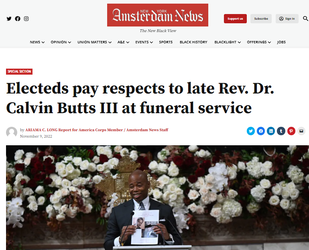
Nov 9, 2022: New York Amsterdam: Electeds pay respects to late Rev. Dr. Calvin Butts III at funeral service
Harlem’s own the Rev. Dr. Calvin Otis Butts III was laid to rest on Friday, Nov. 4, after news of his passing shook the nation. At his funeral, elected officials from all over the state and country were in attendance at Abyssinian Baptist Church, including former President Bill Clinton and Georgian U.S. Sen. Rev. Raphael Warnock.
Butts, 73, was a political powerhouse who had been in bad health for quite some time due to an uphill battle with cancer. He died on Oct. 28. His approximately 5-hour-long funeral services at his beloved church were packed with mourners, followers, and political colleagues he’d worked with throughout the decades.
Some people made jokes, some read poetry or sang, some rallied people to their feet with memories of Butts’ great works, while others were much more somber in their remarks. Still, it was clear that all in attendance were deeply moved by the passing of Butts.
Clinton was the first elected official to speak at the podium. Clinton and Butts had been friends since his presidential election and he spoke to him not long before he passed. He said that Butts not only challenged him but demonstrated faith and wisdom in his lifetime that he had come to rely on.
“He can be blunt and tough but he had a beautiful spirit. And I learned a lot from him and I’m grateful for everything,” said Clinton. “I also occasionally took orders.”
U.S. Senate Majority Leader Chuck Schumer shouted out Butts’ family and children, one of whom worked in his office. He spoke of Butts’ wide reaching network of supporters and disciples. “To all of these souls that the pastor touched from the pulpit here at Abyssinian, to all of the young minds that he cultivated at SUNY Old Westbury out on Long Island,” said Schumer. “Dr. Butts had a positive and indelible impact on all those he encountered. That the fruits of his labor can be found throughout our city, our state, our nation.”
New York State Gov. Kathy Hochul, who was on the campaign trail at the time, stopped at the church to give her remarks. Hochul said that Abyssinian was the first stop she made as soon as she was made governor after former Gov. Andrew Cuomo’s resignation. She asked for a “spiritual blessing” over her time in office from Butts. She called Butts a “beautiful candle” and light of empowerment that can live on.
“I came here because I knew that the place that was so steeped in history, a place where people created leaders. A place where elected leaders, spiritual leaders, community leaders were always in this church,” said Hochul. “And I knew that because I came here and worshiped as lieutenant governor.”
New York City Mayor Eric Adams said that he has been inspired by Butts throughout his career in law enforcement and as a senator and borough president in the city.
“I remember when music was demonizing Black women in our community, and he came with that big construction roller and rolled over the CDs,” said Adams. “And long before people were talking about ‘Don’t advertise alcohol and cigarettes in our community to harm our community,’ he had a white roller brush painting over the posters and said, ‘Lock me up if you want to, because I’m going to stand on truth.’”
Adams acknowledged that many in his administration, such as Deputy Mayor Sheena Wright and Schools Chancellor David Banks, came from Abyssinian. He concluded that he loved Butts and would truly miss him.
“We know how challenging this moment is,” said Adams. “It is for all of us, but nowhere in the contract of life does it say immortality is part of the deal. We’re all mortal. And I can rest assured in all my heart, all of the elected officials in this room he loved, but he adored me.”
Harlem’s own the Rev. Dr. Calvin Otis Butts III was laid to rest on Friday, Nov. 4, after news of his passing shook the nation. At his funeral, elected officials from all over the state and country were in attendance at Abyssinian Baptist Church, including former President Bill Clinton and Georgian U.S. Sen. Rev. Raphael Warnock.
Butts, 73, was a political powerhouse who had been in bad health for quite some time due to an uphill battle with cancer. He died on Oct. 28. His approximately 5-hour-long funeral services at his beloved church were packed with mourners, followers, and political colleagues he’d worked with throughout the decades.
Some people made jokes, some read poetry or sang, some rallied people to their feet with memories of Butts’ great works, while others were much more somber in their remarks. Still, it was clear that all in attendance were deeply moved by the passing of Butts.
Clinton was the first elected official to speak at the podium. Clinton and Butts had been friends since his presidential election and he spoke to him not long before he passed. He said that Butts not only challenged him but demonstrated faith and wisdom in his lifetime that he had come to rely on.
“He can be blunt and tough but he had a beautiful spirit. And I learned a lot from him and I’m grateful for everything,” said Clinton. “I also occasionally took orders.”
U.S. Senate Majority Leader Chuck Schumer shouted out Butts’ family and children, one of whom worked in his office. He spoke of Butts’ wide reaching network of supporters and disciples. “To all of these souls that the pastor touched from the pulpit here at Abyssinian, to all of the young minds that he cultivated at SUNY Old Westbury out on Long Island,” said Schumer. “Dr. Butts had a positive and indelible impact on all those he encountered. That the fruits of his labor can be found throughout our city, our state, our nation.”
New York State Gov. Kathy Hochul, who was on the campaign trail at the time, stopped at the church to give her remarks. Hochul said that Abyssinian was the first stop she made as soon as she was made governor after former Gov. Andrew Cuomo’s resignation. She asked for a “spiritual blessing” over her time in office from Butts. She called Butts a “beautiful candle” and light of empowerment that can live on.
“I came here because I knew that the place that was so steeped in history, a place where people created leaders. A place where elected leaders, spiritual leaders, community leaders were always in this church,” said Hochul. “And I knew that because I came here and worshiped as lieutenant governor.”
New York City Mayor Eric Adams said that he has been inspired by Butts throughout his career in law enforcement and as a senator and borough president in the city.
“I remember when music was demonizing Black women in our community, and he came with that big construction roller and rolled over the CDs,” said Adams. “And long before people were talking about ‘Don’t advertise alcohol and cigarettes in our community to harm our community,’ he had a white roller brush painting over the posters and said, ‘Lock me up if you want to, because I’m going to stand on truth.’”
Adams acknowledged that many in his administration, such as Deputy Mayor Sheena Wright and Schools Chancellor David Banks, came from Abyssinian. He concluded that he loved Butts and would truly miss him.
“We know how challenging this moment is,” said Adams. “It is for all of us, but nowhere in the contract of life does it say immortality is part of the deal. We’re all mortal. And I can rest assured in all my heart, all of the elected officials in this room he loved, but he adored me.”



